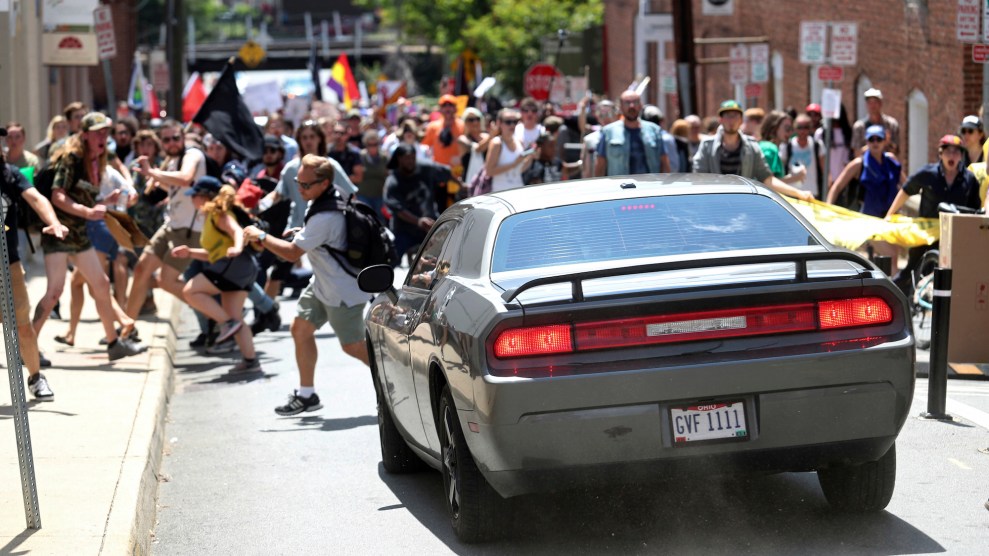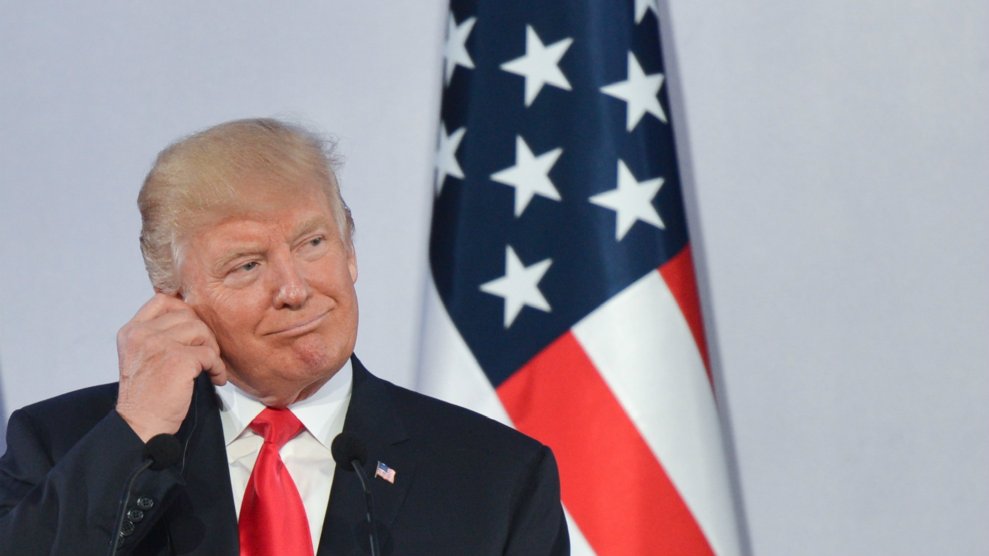
Ryan M. Kelly/AP Photo
On Saturday in Charlottesville, Virginia, 20-year-old James Alex Fields Jr. plowed his Dodge Challenger into a crowd of protesters, killing one and maiming 19, before reversing out of the crowd and speeding away. Fields now faces one count of second-degree murder and three counts of malicious wounding, as well as one count of hit-and-run. His fate, though, could prove quite different if certain Republican legislators were to have their way.
Back in January, a state representative from North Dakota, Republican Keith Kempenich, started what would become a bleak trend: He proposed a piece of legislation that would waive a motorist’s liability for any damages caused by striking any person who was “obstructing vehicular traffic on a public road, street, or highway,” including injury or death. Kempenich’s proposal was born in the wake of the Dakota Access Pipeline (DAPL) protests and was a not-so-subtle jab at the anti-DAPL crowds that stalled construction on the pipeline, in part, by blocking area roads.
Kempenich explained at the time how protesters on the road were catching drivers off guard—“This isn’t their issue,” Kempenich said of motorists—but lamented the fact that, “if something had happened, [motorists would] wind up being accused of it.” He added that when a protester “comes up on the roadway and challenges a motorist… that’s an intentional act of intimidation—the definition of terrorism.”
While Kempenich’s bill died on the House floor in February, it still managed to get 41 yea-votes and to inspire a litany of similarly ill-conceived, GOP-sponsored proposals in statehouses across country. The proposed laws are part of a broad array of anti-protest bills drafted in the wake of Black Lives Matter demonstrations and anti-Trump marches.
Here, we breakdown some other equally short-sighted bills:
- North Carolina: House Bill 330, introduced by Republican representative Justin Burr in March, sets aside civil liability penalties for any motorist who strikes and injures a protester with his or her car, so long as the protest doesn’t have a permit. The bill passed the North Carolina General Assembly 67-to-48 back in May and is currently waiting for action in the state Senate.
- Tennessee: Introduced in early February by Republican state Sen. Bill Ketron and Republican Assembly Member Matthew Hill, Senate Bill 944 and House Bill 668 would have excused any motorist who injured another person participating in a protest or demonstration on a public right-of-way from civil liability for such injury, so long as the motorist was “exercising due care” when the injury occurred. The assembly bill died in the civil justice committee in March, while Senate Bill 944 is still under committee consideration.
- Texas: House Bill 250, introduced by Republican state representative Republican Pat Fallon, would similarly absolve drivers of civil liability should they crash into protesters while exercising “due care.” The bill is currently in committee in the state’s House of Representatives, though Fallon insists his bill would not apply to the “jackass” who mowed down protesters in Virginia.
- Rhode Island: Justin Price, a Republican representative from Exeter, introduced H 5690 in the Rhode Island House on March 1. As you might expect, it waives civil liability for any injury or death caused when a car crashes into a protest occurring on a public roadway so long as the driver was exercising “due care.” The bill is on hold, pending further study.
- Florida: In late February, Republican state Sen. George Gainer introduced Senate Bill 1096. Had it not died in the state Senate’s criminal justice subcommittee, Gainer’s bill would have made protesting in the streets a second-degree misdemeanor and waived motorist liability for the unintentional injury or death of a protester. A parallel House-level bill, introduced by Republican Jayer Williamson, met a similar fate.

















